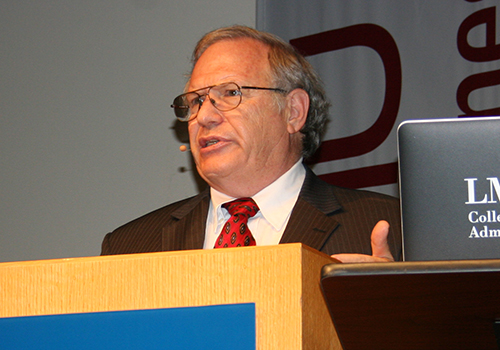
In today’s digitally connected world, technology is replacing accountants, transparency has become mandatory, investors are increasingly turning to indexing and away from active management, and the quality of audits has been called into question. If the accounting profession is to maintain its relevance and value proposition to those who depend on it, what must it do?
LMU’s College of Business Administration welcomed a familiar face to campus on October 4 for a lecture titled “Are Accountants Relevant in Today’s Digital World?” Lynn Turner is the first speaker to be invited back for an encore presentation since the Accounting Ethics Distinguished Speaker Series launched 10 years ago. As senior advisor with Hemming Morse’s Forensic and Financial Consulting Services Group, member of the PCAOB Investor Advisory Group, and former chief accountant at the SEC, there are few more qualified or experienced than Lynn to discuss the current state of the audit industry.
Lynn, who started his career as an auditor at PricewaterhouseCoopers, began by stating that auditing has been around since the 1890s and posed the question: “What is the value of an audit today?” Congress mandated independent audits of public companies in 1933 and the process hasn’t changed much since then. Which is a big problem.
Lynn revealed a major issue with the quality of audits and shared figures that shocked the audience. Today’s audit deficiency rate hovers somewhere between 35-40%. Error rates are especially high for the Big 4 accounting firms (up to 50%!) In a survey last year, public company CFOs estimated that 18% of companies manipulate their earnings by an average of 10%. What seems to be happening is auditors know about the problem but don’t report it. Fraud reporting is often reported by the press (Enron), insiders (Xerox and WorldCom), independent research firms or hedge funds, trustees and regulators (Fannie Mae).
Not only has the auditing process remained the same over the last 40 years, but there’s often a too cozy relationship between auditor and issuer. Interestingly, Europe is way ahead of the U.S. in auditing control standards; they now require the rotation of auditors and auditing reports are detailed and thorough. Another problem is that most audits are done by young inexperienced people who don’t fully understand the business.
So what needs to change? According to Lynn, we need to change the business model of how audits are done, auditors need to recognize that the investor is the customer, use tools available by Wall Street and accountants need to have master’s degrees. Lynn doesn’t expect to see real changes in the near term; in fact, it might not happen until the next blow up. Until then, he encouraged LMU accounting students to be honest, ethical professionals and continue to push for industry change.
Click here to access Lynn’s full presentation on video.



